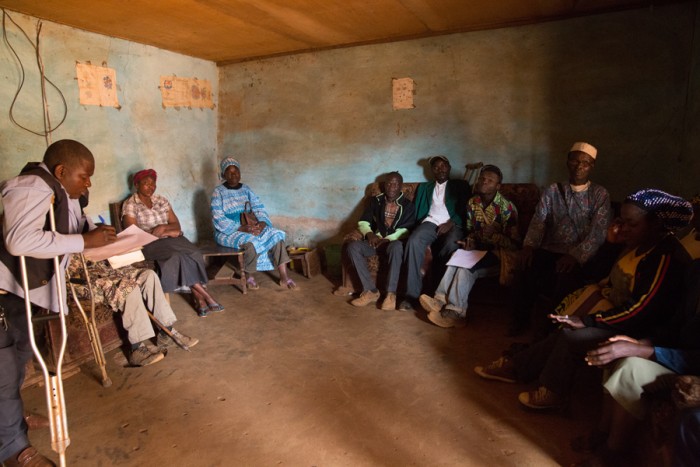February 9th, 2016 by Rachel | Tags: Disability, HIV/AIDS, Peace Corps | No Comments »

To continue my mission to educate as many persons with disabilities as possible about HIV and AIDS, I took a trip to Bali, a village located about 15 minutes by car from Bamenda. In Bali, I met with a group of 12 persons with disabilities to give an education on HIV prevention.
Before I began the presentation, I asked the group, “Who has learned about HIV before?”
“I don’t know anything about HIV,” one woman in the group shouted.
“That is why I am here. You will learn about it now,” I said.
I gave a one hour presentation on HIV prevention which included translation by the president of the group from Grammar English to Pidgin.
As I recalled from the results of pre- and post-tests from the previous HIV Presentations, about 33% of the participants from the presentations showed on the post-tests that they still believed that one can become infected with HIV from sharing clothes and/or hugging someone who is infected with HIV. Thus, in this presentation, I clarified with everyone that HIV and AIDS cannot be transmitted by sharing clothes or hugging by emphasizing the word, “NOT.”
“You canNOT become sick with HIV by sharing clothes,” I told the group.
Like most previous HIV Prevention presentations, I administered the pre- and post-tests. Because I have learned from the results of the previous post-tests on what people still did not understand or learn from the presentations, I made some modifications in this presentations. As a result, the results came out better this time. Eight out of 12 people scored 100% on the post-test. Two missed only one answer and one missed only two answers on the post-test.
On the pre-test, one scored 44% and three scored 33%. On the post-test, one of them achieved 89% and other three of them achieved 100%. This meant that they have really benefited from the presentation.
Only three people in the group showed prior to the presentation that they were already well informed about HIV/AIDS by achieving 100% on the pre-test.
Those who could not read the tests due to low level of literacy and/or visual impairment received assistance from those who could read well and read out loud the questions and answers to them.
The same woman who shouted, “I don’t know anything about HIV,” asked me at the end of the presentation, “Why do we have to learn about HIV?”
“How many of you here have finished school,” I raised my hand, “Actually, who has been to secondary school?”
Two out of 12 people raised their hand.
“Ok, so most of you have either been to only primary school or never been to school, right?,” I asked.
People nodded.
“Only 2% of persons with disabilities receive education in Cameroon. This means that most of you have been denied access to education and never had the opportunity to learn about HIV/AIDS. HIV/AIDS is an epidemic disease. It’s important for you to learn how to prevent from becoming infected with HIV/AIDS so that we can end the disease,” I said.
